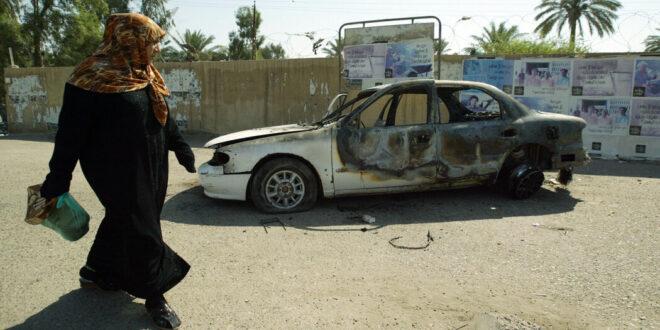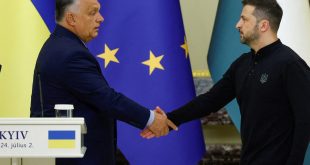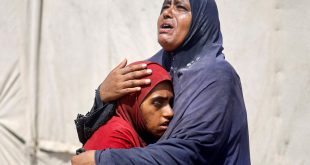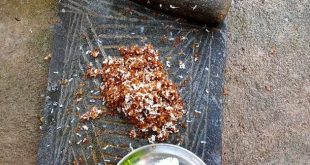BAGHDAD, Iraq — Haider Ahmed Rabia was caught in visitors in Baghdad 13 years in the past when guards with the American safety contractor Blackwater opened fireplace with machine weapons and grenade launchers, killing or wounding a minimum of 31 Iraqi civilians. He nonetheless carries a few of these bullets in his legs.
In 2014, he was one of many survivors and relations who flew to the USA to testify within the trial of 4 of these Blackwater guards, instructed that the proof of his harm and his account of that lethal day may assist carry justice.
“I went to America and noticed the killers strolling free, sporting fits,” he mentioned in an interview in Baghdad on Wednesday. “I mentioned, ‘Tomorrow I’ll return to my nation, however will these killers face justice?’”
“As we speak,” he added, “they proved to me it was simply theater.”
He was talking of President Trump’s pardon this week of those four former Blackwater security contractors, who had been convicted in 2014 in what a U.S. courtroom decided had been unprovoked shootings in Nisour Sq..
The killings solid a harsh highlight on how closely armed American safety contractors had been performing with impunity after the U.S. invasion of Iraq, angering Iraqi officers whose personal investigation also found no evidence to support Blackwater’s claims that the convoy had come below fireplace first.
It was the primary time that many People started coming to grips with the rising position that Blackwater — founded by Erik D. Prince, a former Navy SEAL member and future ally of President Trump — was taking within the sprawling U.S. battle on terrorism, profitable billions of in contracts because the agency racked up accusations of abuses with few consequences.
An already tense relationship between the USA and Iraq grew extra bitter. And the backlash over the killings performed a task in serving to to hurry the withdrawal of U.S. forces from Iraq in 2011, after Iraqi political leaders rejected American calls for for immunity for all U.S. troops.
On Wednesday, Iraq’s overseas ministry urged the U.S. authorities to rethink the choice to pardon the 4 former Blackwater guards, saying in an announcement that the transfer was inconsistent with the U.S. administration’s “declared dedication to the values of human rights, justice and the rule of regulation.”
The investigation was probably the most logistically and legally troublesome ones in latest Justice Division historical past, in response to former division officers who labored immediately on the case.
“We had by no means performed something like this earlier than,” mentioned Ronald C. Machen, the USA legal professional for the District of Columbia on the time and the official who oversaw the case. “We needed to ship groups of F.B.I. brokers and prosecutors over there to construct the case from the bottom up — they needed to danger their lives to gather the proof. We needed to persuade Iraqis who misplaced family members to come back over to testify.”
“And to suppose all of it will get thrown away,” he added.
Amy Jeffress, a high nationwide safety prosecutor on the Justice Division who oversaw the case, mentioned the pardons would have a long-lasting impression on the notion of the USA overseas. “These pardons ship a horrible message to the Division of Justice and to our Iraqi companions who helped with this very troublesome case — and naturally to the victims,” she mentioned.
The occasions in Nisour Sq. on Sept. 16, 2007, started with an explosion elsewhere: a roadside bomb detonating a couple of hundred yards from a closely guarded compound the place officers from the USA Company for Worldwide Improvement had been meeting.
In a metropolis the place safety contractors referred to nearly all of Baghdad as a high-risk “pink zone,” Blackwater guards in armored autos stopped visitors within the sq., a busy intersection a few mile away from the blast, to evacuate the American officers to Saddam Hussein’s former palace compound the place the USA was based mostly.
The Blackwater guards mentioned they believed they got here below fireplace first, although each Iraqi and U.S. investigations rejected their accounts. Different testimony indicated that an preliminary shot by a Blackwater guard killed a driver whose automobile saved rolling. That prompted a volley of machine gun fireplace and rocket-propelled grenades from the safety contractors, who stopped solely after 17 civilians had been lifeless.
Greater than 30 Iraqi witnesses traveled to the USA in what was described by justice officers as the biggest variety of overseas residents to testify at a U.S. legal trial.
Throughout the trial, survivors described the chaos and horror of seeing relations killed as bullets and grenades ripped by way of the skinny metallic of low-cost vehicles. One father, Mohammed Hafedh Abdulrazzaq Kinani, sobbed uncontrollably as he testified concerning the dying of his 9-year-old son, Ali.
A medical pupil, Ahmed Haithem Ahmed, and his mom, Mohassin Kathim, had been the primary to be killed, on an errand as their car approached the sq.. Mr. Ahmed was shot within the head, and Ms. Kathim cradled his physique, crying for assist. The guards saved firing — spherical after spherical, after which an incendiary gadget, killing her as effectively.
Mr. Ahmed’s father later counted 40 bullet holes within the wreckage of the car.
4 former Blackwater guards, Nicholas A. Slatten, Paul A. Slough, Evan S. Liberty and Dustin L. Heard, had been convicted by a federal jury in 2014. Though 17 Iraqis had been killed, the lads had been charged in 14 of the deaths that the F.B.I. discovered violated guidelines for lethal use of pressure.
Mr. Slatten, a former Military sniper who was accused of firing the primary photographs, was convicted of homicide and given a life sentence, whereas the three others had been sentenced to 30 years in jail on manslaughter and weapons fees. In 2019, those three men’s prison terms were cut roughly in half after a earlier courtroom ruling vacated the unique sentencing.
For some survivors of the assault, President Trump’s pardon of the Blackwater contractors was a bitter reminder of what Iraqis have all the time seen as an absence of concern over Iraqi lives.
Mr. Rabia, who’s now 45 and works as an electrical energy ministry worker, nonetheless struggles with nerve injury in his legs.
He was driving his taxi in Nisour Sq. when the Blackwater convoy got here by way of. It was 4 years after the U.S. invasion toppled Saddam Hussein. The nation had fallen right into a brutal civil battle, and within the capital, U.S. forces and safety contractors dominated the roads. Some autos carried indicators with stark warnings: “Keep again 100 meters or you’ll be shot.”
Mr. Rabia mentioned that Iraqi drivers had been caught, ready for the Blackwater convoy to move, when the contractors started opening up with their weapons. He was hit as he scrambled to crawl over to the passenger aspect of the taxi to flee.
Clemency Power ›
Presidential Pardons, Defined
President Trump has discussed potential pardons that might check the boundaries of his constitutional energy to nullify legal legal responsibility. Right here’s some readability on his skill to pardon.
-
- Might a president difficulty potential pardons earlier than any fees or conviction? Sure. In Ex parte Garland, an 1866 case involving a former Accomplice senator who had been pardoned by President Andrew Johnson, the Supreme Courtroom mentioned the pardon energy “extends to each offense identified to the regulation, and could also be exercised at any time after its fee, both earlier than authorized proceedings are taken or throughout their pendency, or after conviction and judgment.” It’s uncommon for a president to difficulty a potential pardon earlier than any fees are filed, however there are examples, maybe most famously President Gerald R. Ford’s pardon in 1974 of Richard M. Nixon to stop him from being prosecuted after the Watergate scandal.
- Might a president pardon his family and shut allies? Sure. The Structure doesn’t bar pardons that increase the looks of self-interest or a battle of curiosity, even when they might provoke a political backlash and public shaming. In 2000, shortly earlier than leaving workplace, President Invoice Clinton issued a slew of controversial pardons, together with to his half brother, Roger Clinton, over a 1985 cocaine conviction for which he had served a few yr in jail, and to Susan H. McDougal, a onetime Clinton enterprise associate who had been jailed as a part of the Whitewater investigation.
- Might a president difficulty a common pardon? That is unclear. Normally, pardons are written in a approach that particularly describes which crimes or units of actions they apply to. There may be little precedent laying out the diploma to which a pardon can be utilized to as an alternative foreclose legal legal responsibility for something and all the pieces.
- Might a president pardon himself? That is unclear. There isn’t any definitive reply as a result of no president has ever tried to pardon himself after which confronted prosecution anyway. Consequently, there has by no means been a case which gave the Supreme Courtroom an opportunity to resolve the query. Within the absence of any controlling precedent, legal thinkers are divided about the matter.
- Find more answers here.
One other survivor, Jasim Mohammad al-Nasrawi, 41, was shot within the head. He survived after Sahib Fakhir picked him up and threw him into his personal automobile as he rushed his wounded son to the hospital. Mr. Fakhir’s son, Mahdi Sahib, 23, died on arrival.
“I used to be stunned by their pardon,” mentioned Mr. al-Nasrawi, who had been driving by way of Nisour Sq. on his solution to ship mail. “That is an act of terrorism. The place are the human rights by Trump and the killers?”
The title Blackwater — the agency based by Mr. Prince, the brother of Training Secretary Betsy DeVos, and constructed up with the assistance of former C.I.A. officers — has grow to be synonymous with what Iraqis keep in mind because the Nisour Sq. bloodbath. Mr. Prince renamed the agency and bought it in 2010, after which it was renamed once more, to Academi.
However there isn’t a seen hint in Nisour Sq. immediately of the 2007 killing. Younger Iraqis take selfies in entrance a bronze statue of the stylized eagles the sq. is known as after, whereas visitors strikes previous lighted billboards promoting family home equipment and cellphone corporations.
Saad Eskander, a historian and the previous head of Iraq’s nationwide archives, mentioned that for a lot of Iraqis, the Nisour Sq. killings are seen as merely one other troubling chapter, a trigger for continued mistrust of People, in a guide of trauma that’s nonetheless being written.
“Iraq has witnessed plenty of unhappy occasions by way of the final 4 a long time when the Iran-Iraq battle broke out,” he mentioned.
Nonetheless, the pardon has opened some outdated wounds, and has refreshed requires Iraq to additional distance itself from the USA.
One of many largest Iranian-backed militias in Iraq, Kataib Hezbollah, demanded that U.S. forces go away Iraq to stop crimes such because the killings in Nisour Sq. from being dedicated once more.
“The legal Trump deliberately pardoned a bunch of mercenaries of the terrorist firm chargeable for the bloodbath in Nisour Sq.,” the group mentioned in an announcement. “This arbitrary and unjust measure confirms the extent of American hostility to the Iraqi folks.”
A distinguished Iraqi lawyer, Tariq Harb, mentioned, “It’s very painful to see the killers launched.”
“The very fact is that they weren’t punished as a result of they killed Iraqis,” he mentioned. “They had been punished for violating the American guidelines of engagement.”
Ali al-Bayati, a member of Iraq’s human rights fee, mentioned the pardons had been a sign that no nation is critical about prosecuting battle crimes.
“This hurts us so much,” Mr. al-Bayati mentioned. “However the accused are American, and the regulation is American, and the president is American, and we will’t do something.”
Michael S. Schmidt contributed reporting from Washington.
 Top Naija News – Nigeria News, Nigerian News & Top Stories Top Naija News – Nigerian Newspapers, Nigerian News. topnaijanews is a daily Nigerian newspaper covering Latest News, Breaking News, Entertainment, Sports, Lifestyle and Politics.
Top Naija News – Nigeria News, Nigerian News & Top Stories Top Naija News – Nigerian Newspapers, Nigerian News. topnaijanews is a daily Nigerian newspaper covering Latest News, Breaking News, Entertainment, Sports, Lifestyle and Politics.




